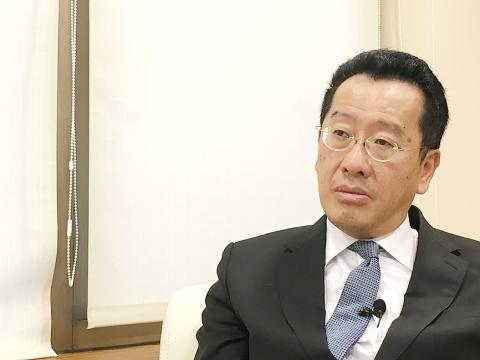The Financial Supervisory Commission (FSC) on Friday said it aims to send a high-level official to a private-sector meeting in China next month where financial supervisory issues will be discussed, in a bid to maintain relations even as political ties have chilled.
FSC Chairman Wellington Koo (顧立雄) said that the commission will send an official of “deputy bureau chief or higher” to the meeting, which he said would be organized by the private sector.
The last time Chinese and Taiwanese financial regulators publicly met was in 2015 at an annual cross-strait meeting.

Photo: Brenda Goh, Reuters
Those meetings, which began in 2011, have not been held since President Tsai Ing-wen (蔡英文) took office in May last year.
Koo declined to give further details about next month’s meeting or comment when asked if there had been meetings with Chinese officials in the past two years.
“There definitely remains a need for information exchange; this can not be broken,” he said.
He added that while the commission hoped to revive the annual meetings, that would depend on the political climate.
“We will continue to go through private-sector events and seminars, and if they allow us to send someone there, we will send a suitable person,” Koo said.
China’s Taiwan Affairs Office was not immediately available for comment on the prospective visit.
Koo, who took the job after Tsai reshuffled the Cabinet in response to softening approval ratings, oversees the nation’s banking industry as well as its policy on financial technology.
Regulators around the world have taken varying positions on fund-raising via digital currencies, such as bitcoin, with Singapore saying in August that it would regulate so-called “initial coin offerings” (ICO) if it judges them to be securities under its laws, while China banned them completely in September.
The commission would look to emulate the Singaporean approach, as it values the blockchain technology that underpinned many ICOs and digital tokens, Koo said
“We cannot do what China did, but are we going to be open to it and treat it like securities with value, futures or derivatives?” Koo asked.
“We have not reached that level of evaluation,” he said.
He also said that the commission is concerned about foreign exchange risks facing local insurers as the New Taiwan dollar hovers near its strongest level against the US dollar in three years.
The insurers have invested heavily in foreign-exchange instruments, such as Formosa bonds, Koo said.
To mitigate such risks, the commission intends to raise the insurers’ reserve requirement ratios next year and also to roll out new management rules, he said.

In Italy’s storied gold-making hubs, jewelers are reworking their designs to trim gold content as they race to blunt the effect of record prices and appeal to shoppers watching their budgets. Gold prices hit a record high on Thursday, surging near US$5,600 an ounce, more than double a year ago as geopolitical concerns and jitters over trade pushed investors toward the safe-haven asset. The rally is putting undue pressure on small artisans as they face mounting demands from customers, including international brands, to produce cheaper items, from signature pieces to wedding rings, according to interviews with four independent jewelers in Italy’s main

Japanese Prime Minister Sanae Takaichi has talked up the benefits of a weaker yen in a campaign speech, adopting a tone at odds with her finance ministry, which has refused to rule out any options to counter excessive foreign exchange volatility. Takaichi later softened her stance, saying she did not have a preference for the yen’s direction. “People say the weak yen is bad right now, but for export industries, it’s a major opportunity,” Takaichi said on Saturday at a rally for Liberal Democratic Party candidate Daishiro Yamagiwa in Kanagawa Prefecture ahead of a snap election on Sunday. “Whether it’s selling food or

CONCERNS: Tech companies investing in AI businesses that purchase their products have raised questions among investors that they are artificially propping up demand Nvidia Corp chief executive officer Jensen Huang (黃仁勳) on Saturday said that the company would be participating in OpenAI’s latest funding round, describing it as potentially “the largest investment we’ve ever made.” “We will invest a great deal of money,” Huang told reporters while visiting Taipei. “I believe in OpenAI. The work that they do is incredible. They’re one of the most consequential companies of our time.” Huang did not say exactly how much Nvidia might contribute, but described the investment as “huge.” “Let Sam announce how much he’s going to raise — it’s for him to decide,” Huang said, referring to OpenAI

The global server market is expected to grow 12.8 percent annually this year, with artificial intelligence (AI) servers projected to account for 16.5 percent, driven by continued investment in AI infrastructure by major cloud service providers (CSPs), market researcher TrendForce Corp (集邦科技) said yesterday. Global AI server shipments this year are expected to increase 28 percent year-on-year to more than 2.7 million units, driven by sustained demand from CSPs and government sovereign cloud projects, TrendForce analyst Frank Kung (龔明德) told the Taipei Times. Demand for GPU-based AI servers, including Nvidia Corp’s GB and Vera Rubin rack systems, is expected to remain high,